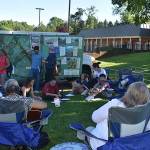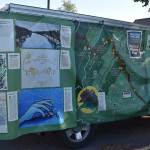‘This is Plan B’
Published 11:46 pm Tuesday, July 10, 2018


After a public hearing in which 14 spoke concerning a proposed campground in the area of Route 56, South James River Road, including the applicant for the campground, the Buckingham County Board of Supervisors voted in favor of approving a special use permit for the campground.
The decision came as six voted in approval, with District Five Supervisor Harry Bryant absent. Twelve of the 14 speakers, including some in public comments, expressed concern or asked the board to deny the special use permit. Two spoke in favor, including applicant Craig White.
White and Ricky Burnley, who own CWRB Associates, LLC, requested a special use permit to establish an RV campground on 43 acres of South James River Road. The campground will be used by those involved with the construction of the Atlantic Coast Pipeline (ACP) and be located adjacent to the pipeline compressor station.
Trending
The compressor station is 53,783 horsepower.
Before the meeting, community members and organizations including Friends of Buckingham, Union Hill/Union Grove Baptist Churches and Yogaville gathered outside of the Buckingham County Administration Office. Participants sang songs, spoke to one another and sat in during the public hearing. A van called the “Sun Bus,” which has solar paneling on its roof, had a map and a collection of photographs and painting detailing the places that would be affected by the ACP. A Circle of Protection interfaith vigil for the Union Hill area will take place July 22 at Union Hill Baptist Church.
The South James River Road property is currently zoned as Agricultural-1. The campground would house up to 27 RVs and would be surrounded by a fence.
Board members modified condition seven to have the campground permit last for five years with a six-month extension period and include “recreation and self-containing camping units.”
White said he would speak with area law enforcement about security measures. White said they would receive revenue per housing unit.
Applicants White and Burnley presented during the hearing. White clarified that he did not purchase the land after the compressor station was announced, but had purchased the land years before to build single family housing. He said the property value decreased following the announcement of the compressor station, describing the process as the pipeline “getting rammed down our throats.”
Trending
White said they could not sell the property, and with he and Burnley having families, they looked for another way to market the property.
“This is Plan B,” White said about the campground. “This is not what we set out to do. And I think that if anybody else was in our situation, you would do the next best thing for your family.”
White said regarding concerns of graveyards that he and his father were ones to discover the graveyards in the area.
“No one talked about that before the pipeline,” White said. “Everyone is concerned about the Union Hill neighborhood. No one was concerned about it before … At the end of the day, Union Hill is going to have a pumping station.”
Richard Walker, the fifth generation from a family at Union Hill, said his family members and neighbors, who are sickly, would experience additional health issues from the pipeline and fumes. He said he is concerned the majority African-American community is being taken advantage of with the pipeline and the proposed campground.
“The citizens of Buckingham don’t deserve this,” Walker said. “They do not deserve this Atlantic Coast Pipeline.”
“I detest it,” Walker said about the board’s decision, saying more research needs to be performed regarding water quality and wetlands in nearby property.
Joseph Jeeva Abbate, of Yogaville, expressed concern that the campground would be located at Union Hill, saying the rural location would be far from restaurants, sewer stations and entertainment venues. He also said the number of employees who would be stationed at the campground is unclear on the application.
He and other applicants expressed concern about the traffic security of the campground, whether there would be adequate presence from the sheriff’s office to prevent alcohol, drug or weapon usage.
Kenda Hanuman noted violations within the application, citing that the signage on the property is obstructed from view as recent as Sunday and said planning commission members failed to notify adjacent landowners on lot 91-58 designated as unknown.
Irene Leech cited concerns about increased abduction, child abuse and sexual assault instances in areas with campgrounds.
“We don’t need to bring problems into our community that we don’t currently have,” Leech said.
Swami Dayananda noted the historical area of Union Hill, particularly graveyards of residents’ ancestors. She encouraged the board to deny the permit, and to survey the area to ensure the graveyard sites would not be affected.
Sammy Smith, a member of the Buckingham County Planning Commission, spoke during the public comment period and cited House Bill 1941/Senate Bill 1413, which cites that immunity is not granted to a speaker who gives false information during a public meeting. Addressing Chairman Danny Allen, Smith said Allen could sue him and other speakers who make public or personal claims that could be proven false. Smith’s statement prompted response from speakers during the hearing.
Gerald Washington voiced support for the campground, citing similar campgrounds in Prince Edward County. While employees in Prince Edward travel to Buckingham to work, Washington said their money is being spent in Prince Edward. He also said White and Burnley and their families live near the compressor station site.
“I know my opinion is not popular based on all of the other comments here tonight, but that’s how I feel as a resident of Buckingham County and as a property owner in the Union Hill area,” Washington said, saying he would potentially be interested in requesting a permit for a campground.
Katherine Mosley had similar concerns about safety, saying there would not be a way for the county or the Union Hill residents to know all of the employees’ backgrounds.
“I hope and pray you all will consider our neighborhood,” Mosley said.
Ella Rose worried about the pipeline activity’s proximity to her home, saying she was not aware of the proposed campground until recently.
“We in the Union Hill neighborhood are already being asked to live with the proposed huge compressor station and all of the intersecting pipelines, endangering our safety and health, and ruining our peaceful existence,” Rose said.
“My home has always felt safe to me, now it is being severely threatened by all of this,” Rose said.







